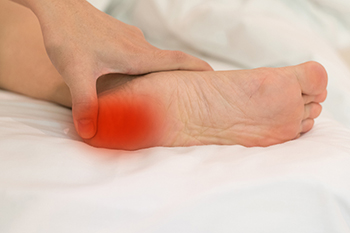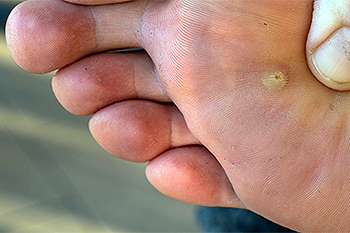Items filtered by date: July 2025
Heel Pain in Growing Children

Sever’s disease, also known as calcaneal apophysitis, is a common cause of heel pain in children, especially during growth spurts between ages 8 and 14. It occurs when the growth plate in the heel becomes inflamed due to repetitive stress from sports or activity. A less commonly known fact is that Sever’s disease often appears in both heels, not just one. Symptoms include heel pain during or after activity, limping, walking on toes, and tenderness at the back of the heel. The heel may look normal but feels sore to the touch, especially after running or jumping. A podiatrist diagnoses Sever’s disease through a physical exam, symptom review, and sometimes imaging to rule out other conditions. Treatment includes rest, stretching exercises, heel cushions, supportive footwear, and sometimes custom orthotics to relieve pressure. If your child is dealing with this condition, it is suggested that you make an appointment with a podiatrist for evaluation and treatment.
Sever's disease often occurs in children and teens. If your child is experiencing foot or ankle pain, see Jim Maxka, DPM from South Penn Foot & Ankle Associates. Our doctor can treat your child’s foot and ankle needs.
Sever’s Disease
Sever’s disease is also known as calcaneal apophysitis, which is a medical condition that causes heel pain I none or both feet. The disease is known to affect children between the ages of 8 and 14.
Sever’s disease occurs when part of the child’s heel known as the growth plate (calcaneal epiphysis) is attached to the Achilles tendon. This area can suffer injury when the muscles and tendons of the growing foot do not keep pace with bone growth. Therefore, the constant pain which one experiences at the back of the heel will make the child unable to put any weight on the heel. The child is then forced to walk on their toes.
Symptoms
Acute pain – Pain associated with Sever’s disease is usually felt in the heel when the child engages in physical activity such as walking, jumping and or running.
Highly active – Children who are very active are among the most susceptible in experiencing Sever’s disease, because of the stress and tension placed on their feet.
If you have any questions, please feel free to contact our office located in Hanover, PA . We offer the newest diagnostic and treatment technologies for all your foot and ankle injuries.
Gout Pain Can Be Managed
Understanding Plantar Warts

Plantar warts are small, rough growths that develop on the soles of the feet due to the human papillomavirus. They often appear as hard, grainy lesions with tiny black dots in the center and may cause pain while walking or standing. These warts can be mistaken for calluses but are often more tender and grow inward due to pressure from standing. They are commonly spread in moist environments like locker rooms or public showers. Individuals with weakened immune systems or those who walk barefoot are at higher risk. A podiatrist can diagnose plantar warts and offer treatments such as topical therapy, cryotherapy, or removal. If you have developed a plantar wart, it is suggested that you seek professional care from a podiatrist to ensure an accurate diagnosis and effective relief from discomfort.
Plantar warts can be very uncomfortable. If you need your feet checked, contact Jim Maxka, DPM from South Penn Foot & Ankle Associates. Our doctor will assist you with all of your foot and ankle needs.
About Plantar Warts
Plantar warts are the result of HPV, or human papillomavirus, getting into open wounds on the feet. They are mostly found on the heels or balls of the feet.
While plantar warts are generally harmless, those experiencing excessive pain or those suffering from diabetes or a compromised immune system require immediate medical care. Plantar warts are easily diagnosed, usually through scraping off a bit of rough skin or by getting a biopsy.
Symptoms
- Lesions on the bottom of your feet, usually rough and grainy
- Hard or thick callused spots
- Wart seeds, which are small clotted blood vessels that look like little black spots
- Pain, discomfort, or tenderness of your feet when walking or standing
Treatment
- Freezing
- Electric tool removal
- Laser Treatment
- Topical Creams (prescription only)
- Over-the-counter medications
To help prevent developing plantar warts, avoid walking barefoot over abrasive surfaces that can cause cuts or wounds for HPV to get into. Avoiding direct contact with other warts, as well as not picking or rubbing existing warts, can help prevent the further spread of plantar warts. However, if you think you have developed plantar warts, speak to your podiatrist. He or she can diagnose the warts on your feet and recommend the appropriate treatment options.
If you have any questions please feel free to contact our office located in Hanover, PA . We offer the newest diagnostic and treatment technologies for all your foot and ankle needs.

